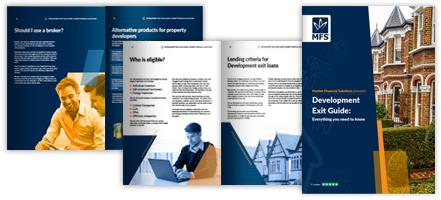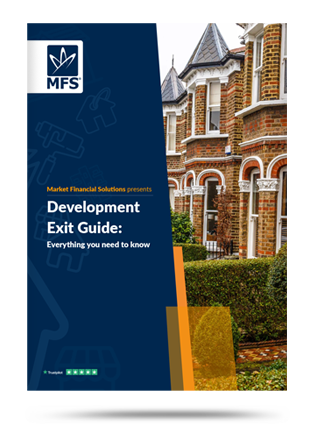Written by Zahira Fayyaz
Head of Key Accounts London & South
Market Financial Solutions are a bridging loan and buy-to-let mortgage provider and are not legal, financial, investment or tax advisers. This document is for informational purposes only and does not, and should not be considered, to constitute legal, financial, investment or tax advice or be relied upon by any person to make a legal, financial, investment or tax decision. Therefore, Investors are encouraged to seek appropriate professional advice. The information in this content is correct at time of writing.

There has been increased focus on conversions as of late. As a result of the pandemic, businesses across the UK were forced to shut down, leaving many commercial spaces empty. Also, the emergence of flexible working made many question how much office space was really needed.
Companies across the continent adapted. According to JLL[1], 48% of its clients in major markets – including Germany, France, and the UK – seek to decrease their commercial real estate footprint over the coming years.
Some, unfortunately, had downsizing forced upon them. At the peak of the pandemic in 2021, there were roughly 165,000 privately owned commercial and business premises empty across Britain[2].
Many people want to see clear action taken on this. Our own independent research from Q4 2023 showed that the public want the government to do more to incentivise people to bring derelict properties to the market, that there needs to be stricter rules on leaving properties vacant, and that most are in favour of commercial conversions.
Both the wider market and the state has taken notice of latter point. Commercial-to-residential conversions have come to the forefront in recent years, and the government has taken steps to facilitate these projects.
Defining commercial conversions
Put simply, commercial conversions are when a commercial property – an office, store, restaurant, etc – is changed to become a new residential property. This will typically involve structural, cosmetic, and other changes made to an existing building.
Across the world, investors and property owners have been exploring their options with commercial conversions, by either looking into turning commercial properties into residential assets[3], or renovating them to accommodate new industries. In London alone, around £2bn[4] was pumped into unwanted offices in mid-2023, getting them ready for new purposes.
Property types, and conversion plans, are tethered to what’s known as use classes[5]. Generally, commercial properties may fall under the class E category, while residential properties will likely be class C. Converting a commercial property will involve changing the use class of a building, which may require approval and/or planning permission[6].
Benefits of commercial conversions
While success is still dependant on an investor’s specific circumstances, there may be many benefits to commercial conversions. From a supply and demand perspective, there’s no getting away from the fact that there’s less demand for commercial property at the moment (offices specifically), but huge, unmet demand[7] for residential properties.
Meeting this demand through conversions may also be relatively cost-effective too. House prices, while hit by the 2022 mini Budget[8], have steadied in recent months, and may only rise from here[9]. Meanwhile, commercial property prices have declined substantially in certain sectors[10]. Vacant commercial properties are likely to be especially cheap at the moment, meaning commercial conversions could end up being very profitable.
It may also be possible to generate higher levels of income with residential properties. Prime office yields in Central London rose between 2022 and 2023, according to Statista[11]. The highest yields of 7.5% could be found in Canary Wharf and Stratford in Q4 2023. Whereas HMOs, comparatively, can often generate between 10-15%[12] in yield.
The wider societal impact will also likely pay dividends. By bringing much needed housing stock to a region, it can potentially have a positive impact on local communities. Leaving commercial and retail spaces vacant can invite anti-social behaviour, vandalism, and economic stagnation[13]. By getting on top of this, and instead encouraging families to utilise new homes, these issues can be amended.
Tax wise, commercial property investors may also face higher tax bills than residential investors[14]. What’s more, by converting commercial properties and engaging with retrofitting, it can reduce the need for new construction and building work, which minimises the environmental impact[15].

What to consider before getting started
While potentially lucrative, there are a few key details that must be considered before engaging with a conversion strategy. Investors may want to research the details of the area, asking themselves questions such as: is there demand for housing? Will the new asset be near transport hubs? how long will the project Take? Etc.
It’s also important to fully get to grips with the rules and regulations involved. Projects may require planning permission from a Local Planning Authority (LPA[16]) via a local council. Each authority will likely have its own specific rules and these must be followed.
Then there are the costs involved. Commercial conversions will likely be expensive for many, especially with building and construction material costs rising in recent years[17]. Not to mention the bills involved with hiring architects, lawyers, project managers and the like.
Given all this, property investors should also ensure they have the right form of finance behind them for the job at hand. Major conversion projects are unlikely to go completely smoothly from start to finish. Where problems do arise, investors will want to make sure they’re working with providers who can adapt to those challenges.
Are there any commercial conversion incentives or support measures available?
Fortunately, incentives have been put forward in recent years to help ease some of these challenges. The launching, and expanding of[18] permitted development rights now allow for certain commercial properties to be converted without full planning permission.
While prior approval from a council is still required, it is now generally much easier to get to work on a project[19]. These rules are continuing to be eased too.
In May, red tape was slashed for the nation’s farmers to make it easier for them to convert unused farm buildings into new homes, shops and gyms[20]. On top of this, investors may be able to take advantage of a range of capital allowances[21]. This is a complicated area however and as such, investors should seek professional tax and legal guidance to find out what incentives they may be entitled to.
The key steps to take with a conversion strategy
While every conversion plan will be different, there are a few key areas all investors could start with. From the outset, investors will want to do their due diligence, and market research. They’ll need to explore what regions have a high number of derelict/underutilised commercial properties, and where residential housing is needed most.
Once, they’ve found a suitable location/property, they’ll then want to make sure they’ve got all their operational ducks in a row. Consultations should be conducted with builders, architects, and all manner of planners to understand the scale of the project, and what the total costs may be. This should also coincide with checking in with the local council to see if planning permission or approval is needed.
A key document will be the schedule of works, which will typically provide a list of the individual jobs required to complete a conversion, along with the costs involved. Having this will allow property investors to then take their plans to a lender to fund the project.
At Market Financial Solutions, we provide permitted & light development bridging loans at the ready to assist with conversion, refurbishment, and renovation plans. Our funding takes into account the wider economic picture, and will be based on the strength of your investment, and the exit strategy at hand.
And while we aim to deliver funding as quickly as possible, seeing that you’ve got a clear schedule of works at the ready, approval from a local council, and other documentation should speed up the process.
We underwrite from day one, which means as your conversion plans evolve, we will evolve with them. We’re ready to get the ball rolling on your commercial conversions.
Development Exit Finance
A complete guide
Everything you need to know
- Benefits & costs
- Difference to development finance
- Application & loan process
- Repayment options
[1] https://www.bbc.com/worklife/article/20240509-corporate-real-estate-on-cliff-edge-to-rethink-communal-spaces
[2] https://www.bigissue.com/news/housing/uk-housing-crisis-empty-offices/
[3] https://www.bbc.com/worklife/article/20230817-major-cities-are-now-with-filled-with-empty-office-buildings-what-happens-next
[4] https://www.ft.com/content/365d49eb-702e-4b1b-aeca-414b1a153e55?accessToken=zwAGGofHDRtAkc82XUnrcC5LG9OuykFLGhU-VQ.MEUCIAgj4t5sijUm9jkOBn3RJntiuN2mo0qXp5E8A0rQos-yAiEAnIRJc7hKKW6awlEliBuGLmrx_W2GFBTpS60n_ADgXow&sharetype=gift&token=a11acec0-c392-44d0-8b27-4fa9ae2a1e4d
[5] https://www.planningportal.co.uk/permission/common-projects/change-of-use/use-classes
[6] https://www.planningportal.co.uk/permission/common-projects/change-of-use/planning-permission
[7] https://www.theguardian.com/society/article/2024/may/11/michael-gove-regret-rise-children-temporary-housing
[8] https://landregistry.data.gov.uk/app/ukhpi/browse?from=2022-09-01&location=http%3A%2F%2Flandregistry.data.gov.uk%2Fid%2Fregion%2Funited-kingdom&to=2024-05-01&lang=en
[9] https://www.standard.co.uk/business/housing-market-homes-prices-house-mortgage-bank-of-england-election-b1162855.html
[10] https://ww3.rics.org/uk/en/journals/property-journal/uk-commercial-property-forecast-2024.html#:~:text=This%20brought%20the%20cumulative%20decline,fall%20of%2021%25%20during%202022.
[11] https://www.statista.com/statistics/716500/office-property-prime-yield-by-district-london-uk/
[12] https://urbanistarchitecture.co.uk/hmo-investment-how-to-increase-your-rental-income/#:~:text=Why%20choose%20HMO%20rather%20than,likely%2015%25%20realistic%20gross%20yield.
[13] https://www.propertymark.co.uk/resource/vacant-properties-are-a-blight-on-high-streets.html
[14] https://www.commercialtrust.co.uk/news/new-regulation-for-property-developers/
[15] https://extensionarchitecture.co.uk/blog/converting-commercial-to-residential-properties/#:~:text=In%20addition%20to%20preserving%20the,and%20minimises%20the%20environmental%20impact
[16] https://www.gov.uk/planning-permission-england-wales
[17] https://www.cladco.co.uk/blog/post/building-material-prices#:~:text=From%20July%202020%20to%20July,increase%20in%20prices%20since%202020.
[18] https://commonslibrary.parliament.uk/research-briefings/sn00485/
[19] https://www.savills.co.uk/insight-and-opinion/savills-news/356947-0/why-now-is-a-good-time-to-revisit-office-to-residential-permitted-development-rights
[20] https://www.gov.uk/government/news/planning-red-tape-slashed-for-farmers
[21] https://www.legendfinancial.co.uk/capital-allowances-on-property/





